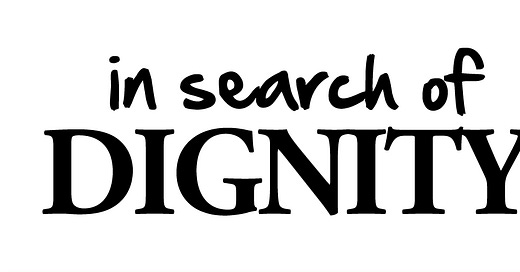Where Can We Find Dignity In Our Lives And Sense Of Personhood?
Dignity.
I'm not sure why, but it seems that every so often our world latches onto certain words and imprints such a polarized gravitas on them that it corrupts the language and subverts the greater significance to there meaning. Dignity is one of those words for me.
It was perhaps a little over a decade ago that I first heard the term, "Dying with dignity." It was a term that never really made sense to me. But like a virus, it corrupted the word and ever since, every time I hear the word "dignity", that same phrase rises to the surface. Dying would be the mask to any and all other depths to the meaning of the word dignity.
When we use the word in academic circles we often seem to talk a lot about the image of God and the idealisms of seeing the value of life in everyone around us (imago Dei). I love the way Amy Kenny describes dignity in this way when she writes:
"There is nothing you can achieve or mess up that can take God‘s image away from you. You don’t have to earn it or prove that you are worth it. It is intrinsic to your being. That means we are not striving to become better versions of ourselves. We are all invited to participate in cultivating the goodness God intended between humans, animals, and the earth, instead of focusing on ‘bettering’ ourselves. We are invested in one another’s flourishing."
– Amy Kenny in ‘My Body Is Not A Prayer Request’
The participation of our image of God as disabled people not only reveals our own interdependent dignity with others, but also the indwelling of our calling to be depended upon for instilling dignity, beauty, and flourishing significance with those same people and the world around us. We call them our community. In doing so, they instil the same dignity within ourselves.
But we can't simply stop at the idealisms of the image of God in all things. Dignity must also be enfleshed, incarnated, embodied -- we must also have an image of Christ (imago Christi). Dignity must find its way into the practical forms of life so as to become the much deeper meanings of living with dignity.
A few weeks ago I heard the question, "What if the worst parts of your life are actually gateways to the very best parts you would never want to live without?" Finding dignity in disability means exploring life's expressions of health and well-being apart from the world's expected perfectionisms. It means discovering new technologies and innovations that redefine human flourishing. We discover dignity in disability when its significance is brought out of marginalization and revealed as a forefront participating presence in art & creativity, politics & social justice, recreation & activity, global economics & employment. Living life to the fullest redeems the essence and depths of what living with dignity means.
There is a difference between dignity & reverence. We cannot approach the subject or event of death without reverence; although we must indeed approach the subject. But dignity has no place in the conversation or question of death as it solely relates to the nature of life and living. To speak of dignity is to create life and the abundance of what it means to exist within the love of creation and the creator. Death ultimately is the submission apart from dignity that was never intended be a part of the natural order. There is never the right time, the right place, or the right way. If we are to redeem the meaning and word of dignity, we must be willing to instill it into the understanding of living life with dignity while exploring all the deep & meaningful ways it reveals who we are as individuals & as a people.
The question of death and dying is not of dignity, but of hope. How can we die well with hope? More importantly, how can we nurture hope for today and the future? This is the question I turn to next.





